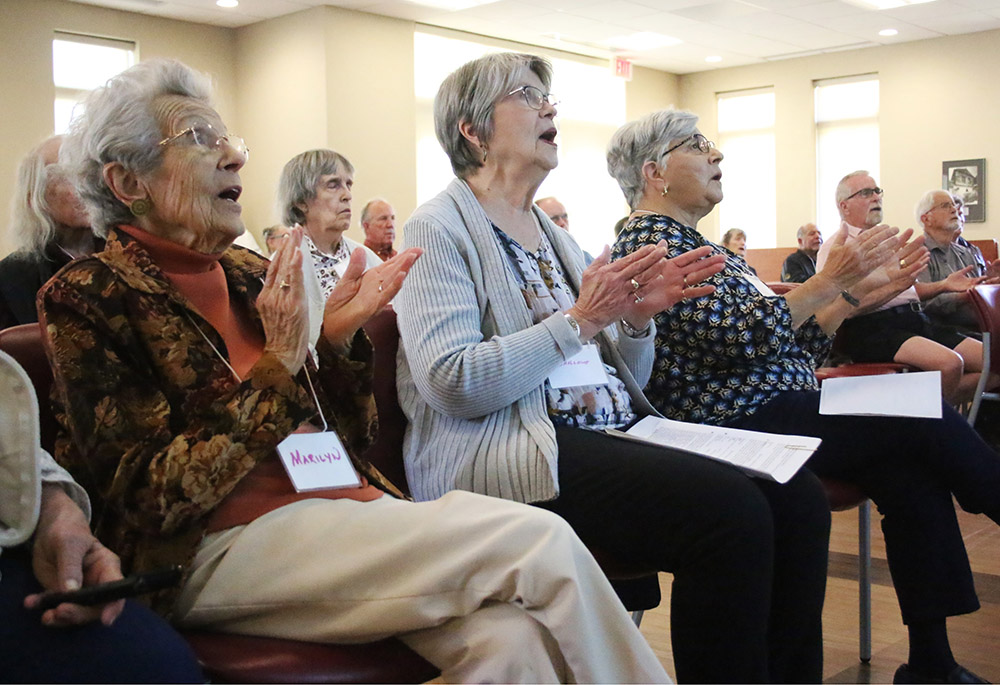
Spiritus community members Marilyn Nagle, Darlene Stout and Cathy Adler* clap during a Nov. 3 prayer service in Beavercreek, Ohio. (NCR photo/Dennis Sadowski)
Matt and Meghann Naveau have a pretty good idea of what it takes to build something from the ground up.
Matt, 39, chief technology officer at a startup software firm, and Meghann, 36, who opened her own communications company and now works as advancement director for a nonprofit group, have experienced the challenges and successes that come with creating a new entity.
Now the University of Dayton graduates are helping lead an effort to create a Marianist lay community in the mission-oriented tradition of the order's founder Blessed William Joseph Chaminade in 19th-century France.
The new community, known as Spiritus, emerged from the longstanding but recently closed Queen of Apostles Community, a non-territorial congregation that was recognized by the Archdiocese of Cincinnati. Established in 1973, that community was affiliated with the Marianist order and was deeply committed to carrying out the Catholic Church's social justice mission.
The congregation met at Queen of Apostles Chapel on the Marianists' expansive Mount St. John property in Beavercreek, just outside of Dayton. A Marianist priest was assigned to serve the congregation.
However, the Marianists in 2022 informed the congregation that because of a lack of available priests, one would no longer be assigned to Queen of Apostles as of Jan. 1, 2024.
And after much talk and discernment, most Queen of Apostles members decided to stay together, seeking help from the Marianists on how to chart a path forward.
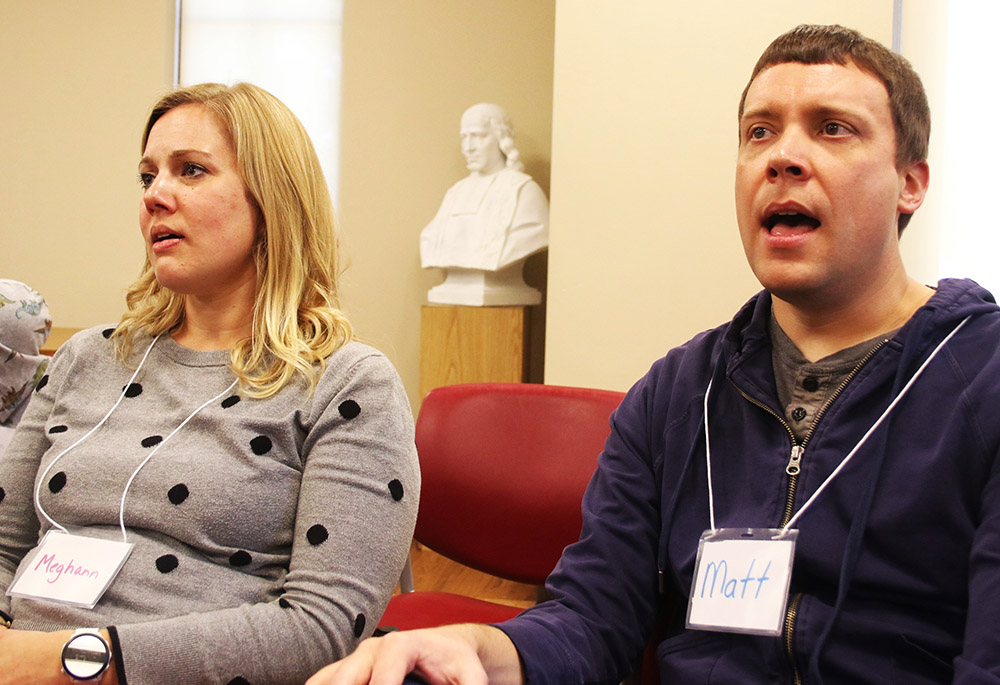
Meghann and Matt Naveau attend a Spiritus service Nov. 3 in Beavercreek, Ohio. (NCR photo/Dennis Sadowski)
The Naveaus, who joined Queen of Apostles in fall 2021, were asked to be part of a transition team with longtime community members and they are now part of the Spiritus leadership team.
While some members have joined other parishes, most have stayed with Spiritus. "People had a real interest in how do we maintain the community that we have and make it open to others," Meghann Naveau told National Catholic Reporter.
"There was not a lot of appetite to be absorbed into a bigger parish and fit in somewhere else. We also didn't want to be a 'shadow parish' [that met on its own]," she added.
The formidable task of starting a new Marianist-connected community was a challenge the transition team members faced as Queen of Apostles prepared for its dissolution. The Naveaus felt it was a sign they had earned the trust of longtime Queen of Apostles members, most of whom are 60-90 years old, even though they had been around for only a couple of years.
"Building a new thing doesn't scare us in a way that I think it would a lot of people," Meghann Naveau said. "Having that startup mentality, we'll try a new thing. And there's the faith element of it."
Matt Naveau, also a member of the Marianist Social Justice Collaborative, said helping bring about Spiritus offers a way to continue exploring how "faith intersects with the real world."
The way forward
Major questions faced the team: What would that new entity look like? What would the process entail? How do we grow?
Eleven months in, a vibrant faith community exists even as those questions continue to be pondered.
The Spiritus Marianist lay community — adopting its name from the Latin word for Holy Spirit — has gathered twice a month on Sunday afternoons since January for Scripture reading, prayer, song, spiritual reflection, sharing, and, most importantly, members said, maintaining a sense of community. Masses are celebrated for the group a few times a year for special events.
The community legally is a nonprofit entity. According to Matt Naveau, members donate to the community to help cover the cost of using a different space at Mount St. John's. Funds also are dispersed to local nonprofits and justice-oriented groups.
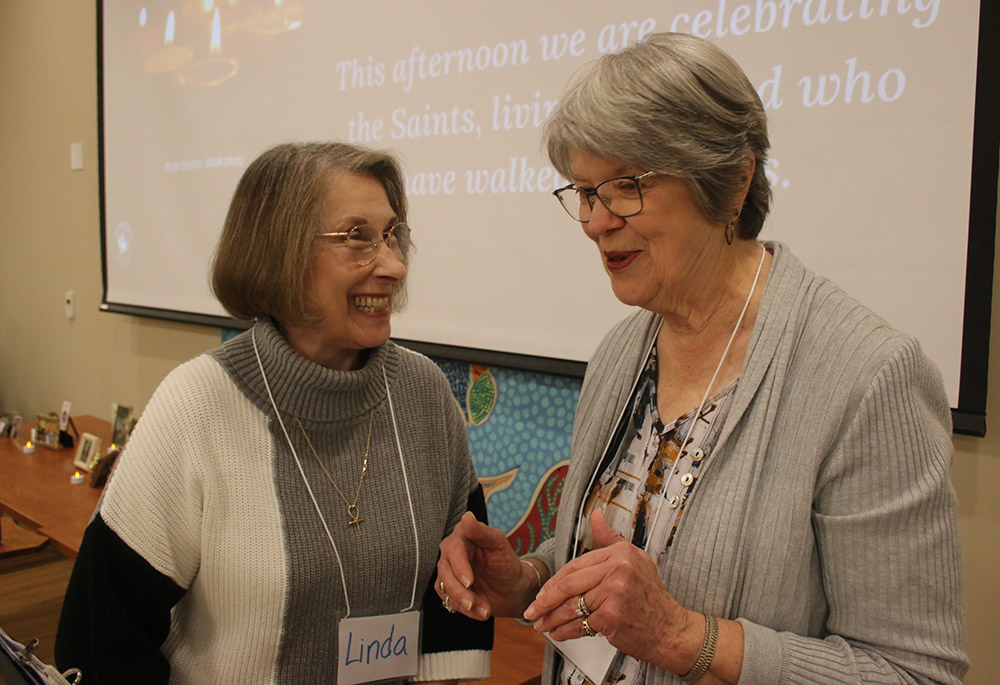
Linda Folmar talks with Spiritus community member Darlene Stout before a service begins Nov. 3 in Beavercreek, Ohio. (NCR photo/Dennis Sadowski)
Linda Folmar, a member of Queen of Apostles almost since its beginning, said many congregation members were concerned about losing their "family of faith," especially because the dissolution meant that people likely would join other parishes.
"They don't just want to go to church for Mass. They want to go to church with a community of believers that they have connections to. That's the thing I find so heartbreaking about what they're doing in other parishes. It's not the same for me to go to another church and just go to a Mass," Folmar said.
Tom Zawodny, 76, who moved to Dayton in 1972 echoed that feeling. "Being from out of town, Queen of Apostles became family, more so than family was family for us."
The Naveau family, which includes son Luke, 9, and daughter Emma, 6, also considered Queen of Apostles and now embrace Spiritus as their spiritual home even as they attend Mass at a separate, traditional parish. The attraction is the Marianist call to inclusive and welcoming relationships with others characterized by the tenet of "discipleship of equals."
Queen of Apostles emerged from a group of Marianist priests, brothers and women religious who began gathering for liturgy in 1972, longtime community member Kevin Skinner said. As word spread about the eucharistic liturgies characterized by contemporary music, commitment to social justice and a welcoming atmosphere, laypeople were invited to participate. It soon led to archdiocesan recognition.
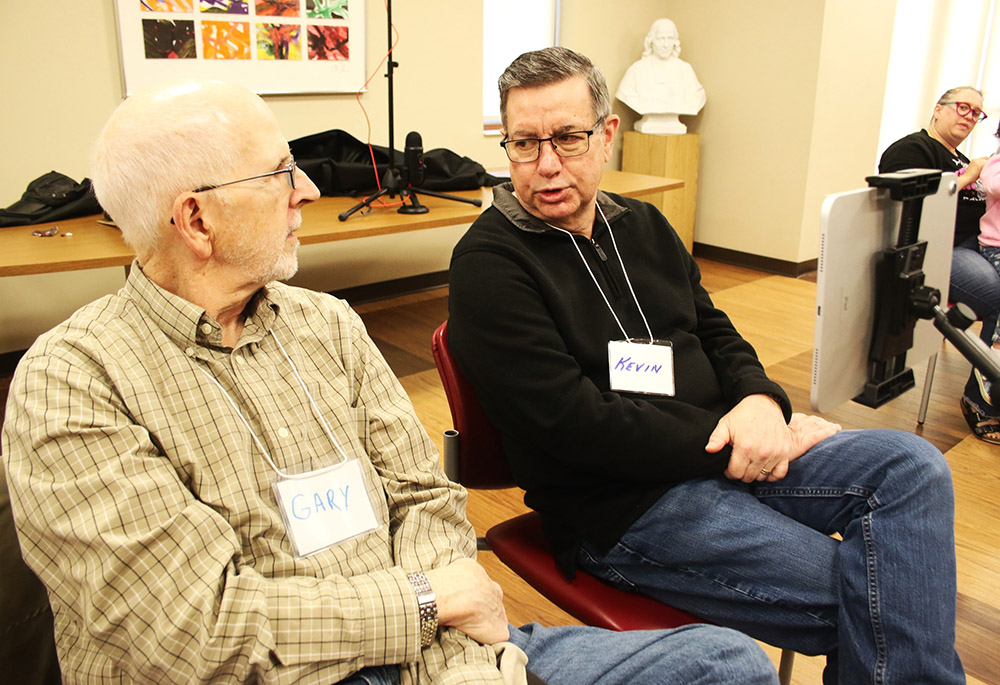
Kevin Skinner, right, talks with Spiritus community member Gary Adler before a service begins Nov. 3 in Beavercreek, Ohio. (NCR photo/Dennis Sadowski)
Lay members oversaw the congregation with a lay coordinator handling day-to-day management. A Marianist priest had the title of pastor, but had little role in the congregation's operation other than liturgical.
"The archdiocese never took any responsibility for it," said Marianist Fr. Thomas Schroer, 82, who served as pastor from 2015 until Queen of Apostles closed and continues to meet with the group. "This was different than a traditional parish because the community took so much responsibility for itself."
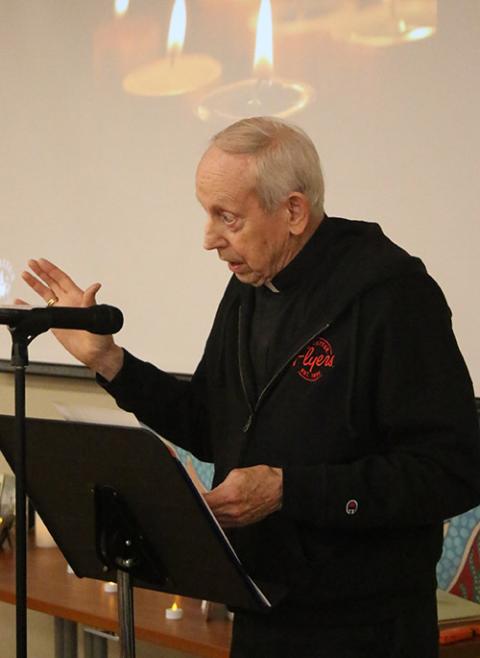
Marianist Fr. Thomas Schroer gives a reflection on the meaning of All Souls Day during a Nov. 3 gathering of the Spiritus community in Beavercreek, Ohio. (NCR photo/Dennis Sadowski)
The community embraced its freedom. In 2006, about 200 households belonged to Queen of Apostles.
"These were individuals who take their faith seriously to want to take an active role within the church. There's some dissatisfaction with the institutional church. That's been there from the beginning. These were people who didn't want to be in a traditional parish," Schroer told NCR.
Staying together
Skinner, who served on the transition team as it evolved into the leadership team until May, said the congregation had about 120 members at its closing. About 80 continue with Spiritus; about 45 to 65 people regularly attend the twice-a-month gatherings, Skinner said.
Not everyone who belongs to Spiritus is Catholic and not all who identify as Catholic have joined a parish since the demise of Queen of Apostles. "And that's OK," he said.
Among members no longer part of the community are a few families with children who joined parishes that have a school.
Marianist Fr. Oscar Vasquez, the order's provincial leader based in St. Louis, said Spiritus illustrates how people can take responsibility for a faith community while carrying the church forward.
"We're very supportive and we've tried to figure out how to make this work," he told NCR. "We have to understand this is the people of God. ... It's important for our church to see that the people are being very discerning about where they worship and what they're looking for in the church."
Members said they recognize that for Spiritus to be a sustainable and justice-focused faith community, they need younger members. They are eyeing a stronger connection to the University of Dayton and looking to connect with traditional Marianist lay communities around Dayton.
'These were individuals who take their faith seriously to want to take an active role within the church. There's some dissatisfaction with the institutional church. That's been there from the beginning.'
—Marianist Fr. Thomas Schroer, Queen of Apostles pastor from 2015 until it closed
Experimental path
The experiment Spiritus represents may well be a model for other parish communities facing a similar fate as the clergy shortage grows, said Rob Brodrick, national director of the Marianist Lay Community of North America.
While Brodrick has seen smaller lay communities form for prayer, support and community service, one as large as Spiritus will be interesting to watch. He compared it to the first Marianist communities organized by laypeople in France in the early 19th century.
"It is very authentic to our tradition, but we haven't organized one of those recently so there's a lot of new challenges," he said.
Advertisement
Brodrick has been advising Spiritus members to help them understand "this is something new ... not a parish under another auspice."
"It's a bigger transition than I think some folks thought because the parish is ... organized around the Mass and the Eucharist, where a Marianist lay community is organized around the mission … of bringing Christ to the world through inclusive, life-giving communities," Brodrick said.
Spiritus is laying the future groundwork for how members of parishes that close can remain connected and build community, he added.
"This is a potential way of building up not only the Marianist family but also the Catholic Church in the 21st century and have real, active, excited and passionate people living out their faith in a way that doesn't compete [with the parish]."
*This story has been updated to correctly identify Cathy Adler in a photo cutline.








